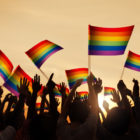I-Team In-Depth
Will New School Year Test New Haven Board’s Policy Aimed At Protecting Transgender And Nonconforming Students?
|
One by one, speakers lined up at a New Haven Board of Education meeting last fall to support a policy ensuring “the safety, comfort, and healthy development” of LGBTQ youths in school. Parents, teachers, advocates and students came forward, most with an anecdote and a plea: to protect children in New Haven schools who are bullied, unable to find safe bathrooms, and are referred to by the wrong pronouns—all because of their gender identity. Following the testimony, the school board unanimously approved the Transgender and Gender Non-Conforming Youth policy. Among other things, it grants students the right to change their name and gender identity on school records without parental permission; the right to be called by their preferred name and pronoun in school; the right to keep this information private without school staff telling parents or peers; access to gender-neutral bathrooms and more. By the end of the school year, what changes had the policy affected?




